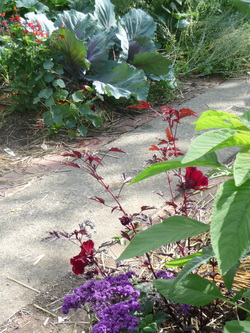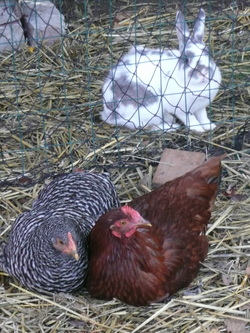Fostering Diversity

The gardens at Wonder-Flora urban homestead are planted in a style reminiscent of the exuberant cottage garden. Vegetables are celebrated for their colors and architectural forms. Annual greens, herbs and flowers are sown in patches throughout the garden, or self-sow as they please. Some combinations are planned and some prove to be serendipitous, as the living tapestry foams and flows through the seasons. Diversity insures resilience.
Varieties are chosen or evolve to be able to adapt to heavy clay soil and shady conditions; soil which is often saturated in winter and nearly baking in summer. Copious quantities of mulch, thus creating humus-rich soil, is essential in tempering these stressors of plant growth. Once established, the gardens (with the exception of potted plants and edibles) are not irrigated and yet remain green and lush all summer.
Varieties are chosen or evolve to be able to adapt to heavy clay soil and shady conditions; soil which is often saturated in winter and nearly baking in summer. Copious quantities of mulch, thus creating humus-rich soil, is essential in tempering these stressors of plant growth. Once established, the gardens (with the exception of potted plants and edibles) are not irrigated and yet remain green and lush all summer.
Meet the Fertilizers

This urban micro-farm currently has nine chickens, a bunny, cat and dog in residence. Each animal is a gift to us and perhaps the chickens and rabbit benefit the garden most of all. They consume great quantities of weeds and in turn provide a source of nitrogen and phosphorus the plants thrive on. The bunny's neat pile is scattered among perennials at times throughout the growing season. This is covered by partially composted leaves and wood shavings so that the soil microbes and earthworms are well fed and happy. (This biologically active soil remains several degrees warmer in winter as evidenced by less frost compared to the neighbor's yards.) The chicken's pen is continually layered with straw, and the "deep litter" is then composted for fertilizing vegetables. Horse and goat manure, grass and hay are also added to the compost. All the animals are fed organic grains, herbal medicines and run all day in a large yard.